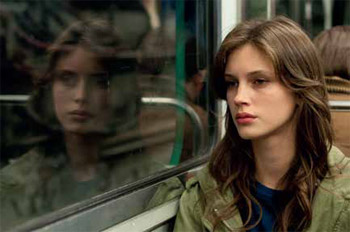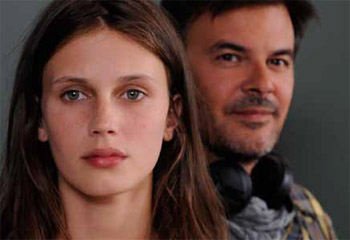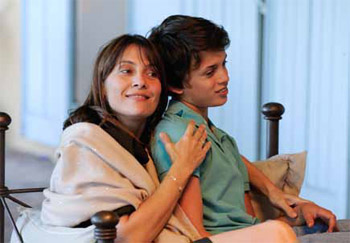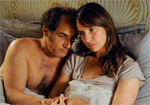Francois Ozon Young and Beautiful Interview

Francois Ozon Young and Beautiful Interview
Cast: Marine Vacth, Geraldine Pailhas, Frederic Pierrot
Director: Francois Ozon
Genre: Drama
Rated: R
Running Time: 94 minutes
Synopsis: Nuanced, elegant and thought-provoking, Young & Beautiful, the latest film from renowned French director François Ozon (Swimming Pool) is a portrait of 17-year-old Isabelle (Marine Vacth), a beautiful yet distant, bourgeois Parisian student. Set over a year, divided into four seasonal chapters, it chronicles Isabelle's sexual journey. From the awakening of her desires, and shedding her virginity in an emotionless act at her family's summer vacation villa, this propels her when returning to Paris to embark on a secret life, hiring herself out as a high-end prostitute. There's a calm sense of purpose to the way Isabelle approaches her transgressions, and when events take a dramatic turn, there's no black-and-white answers.
The mysteries of adolescence, and in particular, the sense of control and power that can accompany a gorgeous girl's discovery of her sexuality, are explored with hypnotic focus. Driven by a transfixing performance from the incandescent Marine Vacth, Young & Beautiful is both psychologically probing and unerringly graceful in its nonjudgmental restraint. It fuels our desires, captivates our intellect, and leaves us wondering whether our motivations can ever truly be known.
Young and Beautiful
Release Date: May 1st, 2014
 Interview with Francois Ozon
Interview with Francois Ozon
Question:What was the catalyst for Young and Beautiful?
François Ozon: Directing Ernst Umhauer and Bastien Ughetto for In The House was such a pleasure I wanted to work with young actors again. My early shorts and features explored adolescence, but from Under The Sand on, I've worked essentially with older actors. So Young and Beautiful started with my desire to film the youth of today. And since I had just filmed boys, I wanted to film a young woman.
Question: Isabelle is not just any young woman – she's working as a prostitute.
François Ozon: The film is about what it feels like to be seventeen and experiencing the transformation of one's body. Adolescence is often idealised in cinema. For me it was a painful period of complicated transition and I'm not nostalgic about it. I didn't want to depict adolescence merely as an emotional time but also and above all as a hormonal one. Our bodies go through intense physiological changes, and yet we feel kind of numb. So we assault our bodies in order to feel, we test our limits physically. The theme of prostitution provides a way to highlight this, to illustrate the questions of identity and sexuality raised by adolescence. Sexuality not yet connected to emotion.
Question: Isabelle's family is financially comfortable, so she's not doing it for the money.
François Ozon: Isabelle isn't turning tricks to survive or to pay for school, she feels a visceral need to do it. She could have just as easily gotten into drugs or become anorexic, as long as it was something secret, clandestine, forbidden. Adolescence is a fertile period when anything is possible. That's what's so exhilarating about it, what comes across in Rimbaud's poem No One's Serious At Seventeen. You're open to the world, unconcerned with morals. Isabelle is experimenting; embarking on a journey, her foray into prostitution is not a perversion.
Question: Isabelle is not so much exploring pleasure as she is confronting her absence of emotion, notably when she loses her virginity.
François Ozon: During a conversation with Marina de Van I got the idea of showing duality in the character at the critical moment of her deflowering. Boys and girls alike may experience an out-of-body sensation as they discover their sexuality. You're both there and not there, actor and observer. That scene prepares the audience for Isabelle's double life.
Question: The film opens on Isabelle as seen through her little brother's binoculars. Right away, she is objectified by a stolen gaze that 'violates" her privacy.
François Ozon: Absolutely. Isabelle's behaviour sets off strong repercussions and provokes powerful reactions from those close to her. Each season begins with the point of view of a different character. Summer is Isabelle's brother, autumn is her client, winter is her mother and spring is her stepfather – though each time we rapidly shift back to Isabelle. I wanted to move through the film in a circular fashion around the four seasons. As in 5X2, I'm concentrating on specific moments to explore what's going on.
Question: There is also a Françoise Hardy song for each season.
François Ozon: Yes. I like to set up a formal framework inside which I have total freedom. It was important to me that the story should take place over one school year. The songs come like punctuation, suspended moments. This is my third time using Françoise Hardy songs, after Traüme in Water Drops On Burning Rocks and Message Personnel in 8 Women. I really like how she captures the essence of teen love: the heartbreak, the disillusions, the romance… I found it interesting to juxtapose this iconic viewpoint with a more raw portrait of Isabelle. Deep down Isabelle yearns to embrace this sentimental, idealised model of adolescence, and her parents also want that for her. But she must find herself, and confront her contradictions, before she can fall in love.
Question: Subway escalators, hotel hallways... you play with recurring locations as Isabelle goes to meet her clients.
François Ozon: Like all clandestine experiences it becomes a ritual, involving a costume and recurring locations. The ritualistic aspect is what Isabelle likes: connecting on the internet, imagining who the clients will be, negotiating the price, going to meet them, etcetera. She tells the psychiatrist that she feels almost nothing during the actual act – what excites her about prostitution is the adventure of it, the exhilaration of engaging in an illicit activity that breaks the monotony of her teenage existence. Many of the characters in my films share a desire to escape reality. At the end of the film some audience members are convinced she'll start hooking again, that she's addicted to it, like a drug.
Question: Teenage prostitution is a big issue right now. How did you approach this story without turning it into a sociological study?
François Ozon: I did my research, of course, because things have changed since I was a teenager, notably the means of communication used to learn about sex: cell phones, internet... In my day, it was the Minitel! So I went looking for information. I met with police officers who work with juveniles, others who specialise in new forms of prostitution, and psychoanalyst Serge Hefez, who works with troubled teens. I needed this material to confirm my hunches and enrich the film. But then I needed to detach from it and let fiction take over.
 Question: Isabelle's father is absent but you don't use that to explain her behavior.
Question: Isabelle's father is absent but you don't use that to explain her behavior. François Ozon: No. I provide a few clues that people can latch onto, or not. The reasons for Isabelle's behaviour are many. Everyone is free to interpret it in their own way. I like for the audience to have that freedom. This young woman is a mystery to me, too. I'm not ahead of her; I'm simply following her, like an entomologist gradually falling in love with the creature he's studying. She says very little. The only time she opens up is during her second visit to the shrink. The idea is to accompany her, identify with her. We identify with much of what Isabelle and her parents are going through, undoubtedly because the situations are anchored in reality and the actors are very convincing. Each character is reeling from a complex situation, trying to handle it the best they can.
Question: How did you approach the sex scenes?
François Ozon: I wanted them to be fairly realistic, but not degrading or sordid. I wanted to avoid moral judgments. Obviously some of the clients are a bit deviant, but the point is to show how Isabelle adapts. Isabelle is on the receiving end of other people's desire when she has yet to discover her own. In a certain sense it suits her that others feel desire in her place. I didn't want to embellish reality, but in a sense, Isabelle may be doing that herself.
Question: One client is different than the others: Georges.
François Ozon: Yes, Isabelle and Georges have a connection. She may even feel pleasure with him. He touches her, looks at her. Their encounters are tender, not at all mechanical like the others. Despite his age, Georges is very attractive, seductive, sexy. That's why I chose Johan Leysen for the role. I wanted the audience to believe he could appeal to Isabelle. Johan Leysen has a beautifully chiseled face, his voice and accent are charming. He has the physique of an American actor, like Clint Eastwood!
Question: What led you to Marine Vacth for Isabelle?
François Ozon: As with the young lead for In the House, I realised it would be better to work with an actress who was slightly older than the role, someone with maturity and distance. I'd seen Marine in My Piece Of The Pie by Cédric Klapisch. The moment I met her, I was struck by an impression of extreme fragility and at the same time, strength. She is extremely photogenic, and not just on the surface. Filming her reminded me of filming Charlotte Rampling in Under The Sand. Her face, the texture of her skin... there's something going on beneath the surface. Her obvious physical beauty holds a mystery, a secret. It arouses our curiosity, we want to know more.
Question: This is her first leading role.
François Ozon: And it's a heavy role. We discussed it extensively beforehand, did readings and rehearsed with the other actors. I made sure she was very involved in the preparation process, let her help choose her costumes and follow the evolution of the script. I needed her to trust me, understand what we were doing, and bond with the other actors, especially Géraldine Pailhas and Fantin Ravat. The fact that she also models makes her very free with her body, which she uses like a tool. She was more comfortable than some actresses would have been.
 Question: The mother character is also very important.
Question: The mother character is also very important. François Ozon: Right. At one point I really wanted to shift the focus to her, to capture her reaction to her daughter's sex life (and not love life). Prostitution exacerbates the situation, of course, but all parents must face these questions: How does their child's sexuality affect them? What are their fears, anxieties? How much should they know about their child's private life? How much should they interfere?
Question: How did you imagine the mother-daughter relationship?
François Ozon: I wanted them to be close in age but not to the point of being 'friends". I wanted the mother to come across as a very good mother, to prevent Isabelle's foray into prostitution from being explained away as a consequence of their relationship. The mother is a very modern woman, like many mothers of my generation. I wanted her to be beautiful and sexually fulfilled, to avoid the mother-daughter rivalry so often seen in films today. That's not what their relationship is about. Even when she catches her daughter in a late-night conversation with the stepfather, she does not feel threatened. This is not a story about a daughter taking her mother's place. But Isabelle does have a diabolical side. We can see why her mother's friend doesn't want her husband to take her home.
Question: Nathalie's fear is more about the mechanism of desire than Isabelle's behavior.
François Ozon: Absolutely. The idea that Isabelle could behave as a 'whore" and contaminate everyone is mostly in the minds of those around her. She doesn't think about it, but they do. Her beauty and her sensuality force them to confront the hypocrisy of their own desires.
Question: Isabelle is not angry at her mother for having a lover so much as she is angry at her for keeping it a secret, not trusting her.
François Ozon: Adolescence is also a difficult period because children are discovering that their parents are not the heroes they thought they were, they've kept things from them, lied to them. Teenagers need truth, sincerity. They find out the world of adults is full of hypocrisy and lies, and they grow hostile toward these parents who have fallen from their pedestals.
Question: When the mother hits her daughter, we are more moved than shocked.
François Ozon: I discussed this scene at length with my female friends. I asked them how they would react if, like Isabelle's mother, they found out their daughter was working as a prostitute. Most of them said, 'It'd be horrible, I'd blame myself, I'd try to understand." They tended to evoke a positive, understanding approach, but then one of the women, whose daughter had gotten into drugs, admitted to me that when she found out, she hit her. That made sense to me. Parents who are at a loss for what to do or say to their sulking, withdrawn teenagers may quite naturally be pushed to lash out physically at them. As a mother, Géraldine agreed with this reaction but felt it was important for her character to immediately recognise the impulsive nature of her act and feel the need to apologise for it.
Question: How did you choose Géraldine Pailhas to play Isabelle's mother?
François Ozon: Once I'd chosen Marine, I sought an actress who could physically pass for her mother. I wanted a woman with a natural, maternal aura about her. I knew Géraldine, we'd already worked together, she had a small part in 5X2. We did some tests and they went very well. I could tell she was moved by the role and projecting herself into the story. She got really involved in the film. She was very protective of Marine, it was a beautiful thing to see. They truly bonded, there was no rivalry whatsoever between them.
Question: There is no rivalry with Georges' wife either.
François Ozon: No, Georges' wife actually identifies with Isabelle. And as an actress, Charlotte Rampling can see herself in Marine, as can Géraldine for that matter. Both of them began their careers very young and were extremely exposed. I wanted the other actresses on the film to feel benevolent toward Marine. It was important to me that the other actresses represent a kind of transmission. Charlotte was an obvious choice, especially once I'd found Marine. She has played many transgressive, highly sexualized roles. She has often been perceived as the embodiment of fantasy in film, making her ideal to play this woman who understands Isabelle without judging her. And when she takes Isabelle to the hotel room, Charlotte still exudes that transgressive, dangerous energy.
Question: Is that scene real or does Isabelle imagine it?
François Ozon: The last shot suggests she may have imagined it, but it doesn't matter whether it was real or a dream, either way the scene is healing. There is communication, a truthful exchange that Isabelle couldn't have had with her mother. It helps her assume responsibility for what she's done.
Question: Tell us about Serge Hefez, the psychiatrist.
François Ozon: I met him while I was writing the script as part of my research, then had him read the script and comment on certain key points, particularly the psychiatrist's attitude when Isabelle says she wants to pay for her sessions with the money she earned as a prostitute. I had some famous actors in mind, but Serge was so attractive and intelligent I offered him the role, and he accepted. His office inspired me for the office in the film, he even loaned us his chairs! He was very good in the screen tests, but I felt he was smiling a little too much. He told me that's what he does with his teenage patients in real life. They generally come against their will, forced by their parents. So it's important for him to connect with them right away, show them he's on their side, even if it means being in opposition to the parents. I used that in his scene with the mother and daughter, he is clearly on Isabelle's side.
Question: Tell us about the scene where the students recite, then comment on, the Rimbaud poem.
François Ozon: I hoped to capture the fragility and beauty of adolescence in that scene. Other than Marine and the actors who play her friends and boyfriend, none of the teens were professionals − some of them were actual students from Henri IV. After they recited the poem, I asked them to analyse it for the teacher, express how they felt, give us their interpretation. None of that was scripted. I shot that scene like a documentary. I'd recently rediscovered Vivre Sa Vie (My Life To ive), another film about youth and prostitution, in which Godard interviewed actual prostitutes. I wanted to anchor my film in reality too, to hear the voices and viewpoints of these young people of today. Maybe to find out if they viewed the world the same way I did when I was seventeen.
Young and Beautiful
Release Date: May 1st, 2014
Have You Seen This?
MORE
- Mission: Impossible Fallout
- Glenn Close The Wife
- Allison Chhorn Stanley's Mouth Interview
- Benicio Del Toro Sicario: Day of the Soldado
- Dame Judi Dench Tea With The Dames
- Sandra Bullock Ocean's 8
- Chris Pratt Jurassic World: Fallen Kingdom
- Claudia Sangiorgi Dalimore and Michelle Grace...
- Rachel McAdams Disobedience Interview
- Sebastián Lelio and Alessandro Nivola...
- Perri Cummings Trench Interview






